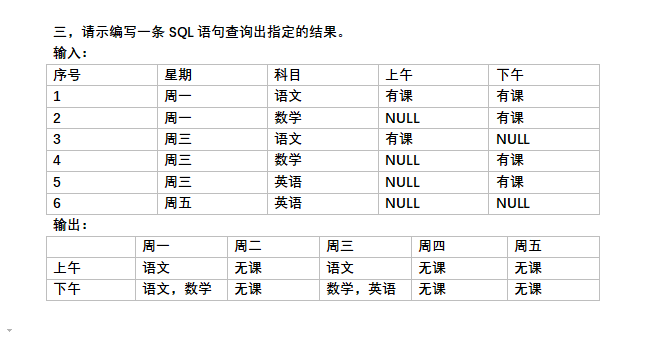How can I make a package that returns results in table format when passed in csv values.
select * from table(schema.mypackage.myfunction('one, two, three'))
should return
one
two
three
I tried something from ask tom but that only works with sql types.
I am using oracle 11g. Is there something built-in?
The following works
invoke it as
select * from table(splitter('a,b,c,d'))
create or replace function splitter(p_str in varchar2) return sys.odcivarchar2list
is
v_tab sys.odcivarchar2list:=new sys.odcivarchar2list();
begin
with cte as (select level ind from dual
connect by
level <=regexp_count(p_str,',') +1
)
select regexp_substr(p_str,'[^,]+',1,ind)
bulk collect into v_tab
from cte;
return v_tab;
end;
/
Alas, in 11g we still have to handroll our own PL/SQL tokenizers, using SQL types. In 11gR2 Oracle gave us a aggregating function to concatenate results into a CSV string, so perhaps in 12i they will provide the reverse capability.
If you don't want to create a SQL type especially you can use the built-in SYS.DBMS_DEBUG_VC2COLL, like this:
create or replace function string_tokenizer
(p_string in varchar2
, p_separator in varchar2 := ',')
return sys.dbms_debug_vc2coll
is
return_value SYS.DBMS_DEBUG_VC2COLL;
pattern varchar2(250);
begin
pattern := '[^('''||p_separator||''')]+' ;
select trim(regexp_substr (p_string, pattern, 1, level)) token
bulk collect into return_value
from dual
where regexp_substr (p_string, pattern, 1, level) is not null
connect by regexp_instr (p_string, pattern, 1, level) > 0;
return return_value;
end string_tokenizer;
/
Here it is in action:
SQL> select * from table (string_tokenizer('one, two, three'))
2 /
COLUMN_VALUE
----------------------------------------------------------------
one
two
three
SQL>
Acknowledgement: this code is a variant of some code I found on Tanel Poder's blog.
Here is another solution using a regular expression matcher entirely in sql.
SELECT regexp_substr('one,two,three','[^,]+', 1, level) abc
FROM dual
CONNECT BY regexp_substr('one,two,three', '[^,]+', 1, level) IS NOT NULL
For optimal performance, it is best to avoid using hierarchical (CONNECT BY) queries in the splitter function.
The following splitter function performs a good deal better when applied to greater data volumes
CREATE OR REPLACE FUNCTION row2col(p_clob_text IN VARCHAR2)
RETURN sys.dbms_debug_vc2coll PIPELINED
IS
next_new_line_indx PLS_INTEGER;
remaining_text VARCHAR2(20000);
next_piece_for_piping VARCHAR2(20000);
BEGIN
remaining_text := p_clob_text;
LOOP
next_new_line_indx := instr(remaining_text, ',');
next_piece_for_piping :=
CASE
WHEN next_new_line_indx <> 0 THEN
TRIM(SUBSTR(remaining_text, 1, next_new_line_indx-1))
ELSE
TRIM(SUBSTR(remaining_text, 1))
END;
remaining_text := SUBSTR(remaining_text, next_new_line_indx+1 );
PIPE ROW(next_piece_for_piping);
EXIT WHEN next_new_line_indx = 0 OR remaining_text IS NULL;
END LOOP;
RETURN;
END row2col;
/
This performance difference can be observed below (I used the function splitter as was given earlier in this discussion).
SQL> SET TIMING ON
SQL>
SQL> WITH SRC AS (
2 SELECT rownum||',a,b,c,d,e,f,g,h,i,j,k,l,m,n,o,p,q,r,s,t,u,v,w,x,y,z'||rownum txt
3 FROM DUAL
4 CONNECT BY LEVEL <=10000
5 )
6 SELECT NULL
7 FROM SRC, TABLE(SYSTEM.row2col(txt)) t
8 HAVING MAX(t.column_value) > 'zzz'
9 ;
no rows selected
Elapsed: 00:00:00.93
SQL>
SQL> WITH SRC AS (
2 SELECT rownum||',a,b,c,d,e,f,g,h,i,j,k,l,m,n,o,p,q,r,s,t,u,v,w,x,y,z'||rownum txt
3 FROM DUAL
4 CONNECT BY LEVEL <=10000
5 )
6 SELECT NULL
7 FROM SRC, TABLE(splitter(txt)) t
8 HAVING MAX(t.column_value) > 'zzz'
9 ;
no rows selected
Elapsed: 00:00:14.90
SQL>
SQL> SET TIMING OFF
SQL>
I don't have 11g installed to play with, but there is a PIVOT and UNPIVOT operation for converting columns to rows / rows to columns, that may be a good starting point.
http://www.oracle.com/technology/pub/articles/oracle-database-11g-top-features/11g-pivot.html
(Having actually done some further investigation, this doesn't look suitable for this case - it works with actual rows / columns, but not sets of data in a column).
There is also DBMS_UTILITY.comma_to_table and table_to_comma for converting CSV lists into pl/sql tables. There are some limitations (handling linefeeds, etc) but may be a good starting point.
My inclination would be to use the TYPE approach, with a simple function that does comma_to_table, then PIPE ROW for each entry in the result of comma_to_table (unfortunately, DBMS_UTILITY.comma_to_table is a procedure so cannot call from SQL).


